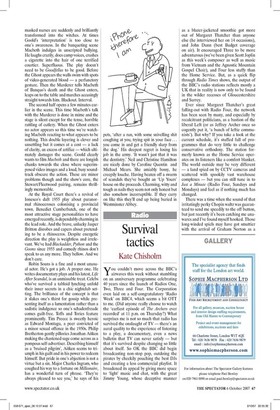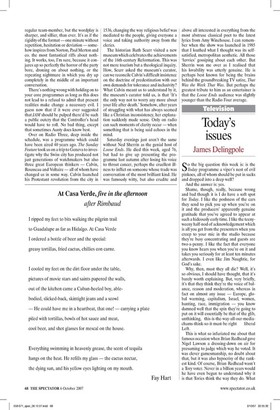Survival tactics
Kate Chisholm you couldn't move across the BBC's airwaves this week without stumbling on an anniversary programme celebrating 40 years since the launch of Radios One, Two, Three and Four. The Corporation even laid on a self-congratulatory 'Radio Week' on BBC4, which seems a bit OTT to me. (Did anyone really choose to watch the 'earliest episode of The Archers ever recorded' at 11 p.m. on Thursday?) What surprises me is not so much that radio has survived the onslaught of TV — there's an aural quality to the experience of listening to a play, a documentary, even a news bulletin that TV can never satisfy — but that it's survived despite changing so little about itself. So OK the BBC did begin broadcasting non-stop pop, outdoing the pirates by cheekily poaching the best DJs and creating a less commercial playlist. It broadened its appeal by giving more space to 'light' music and chat, with the great Jimmy Young, whose deceptive manner as a blazer-jacketed smoothie got more out of Margaret Thatcher than anyone else (he interviewed her on 14 occasions), and John Dunn (best Budget coverage on air). It encouraged Three to be more adventurous (we've been given Scott Joplin as this week's composer as well as music from Vietnam and the Agnostic Mountain Gospel Choir), and Four less stuffy than the Home Service. But, as a quick flip through Radio Times shows, the output of the BBC's radio stations reflects mostly a UK that in reality is now only to be found in the wilder recesses of Gloucestershire and Surrey.
Ever since Margaret Thatcher's great falling-out with Radio Four, the network has been seen by many, and especially by recalcitrant politicians, as a bastion of the liberal Left (or as Jeffrey Archer once so cogently put it, 'a bunch of leftie communists'). But why? If you take a look at the current schedule, it's stuffed full of programmes that do very little to challenge conservative orthodoxy. The station formerly known as the Home Service operates on its listeners like a comfort blanket. The world outside may be very different — a land spied on by CCTV cameras and scattered with spookily vast warehouse complexes — but you can still tune in to Just a Minute (Radio Four, Sundays and Mondays) and feel as if nothing much has changed.
There was a time when the sound of that irritatingly perky Chopin waltz was guaranteed to send me speedily to the off button, but just recently it's been catching me unawares and I've found myself hooked. Those long-winded spiels may have got smuttier with the arrival of Graham Norton as a regular team-member, but the wordplay is sharper, and sillier, than ever. It's as if the rigidity of the format — one minute without repetition, hesitation or deviation — somehow inspires from Norton, Paul Merton and co. the most fantastical riffs about nothing. It works, too, I'm sure, because it conjures up so perfectly the horror of the party bore, droning on about nothing, or the repeating nightmare in which you dry up completely in the middle of an important conversation.
There's nothing wrong with holding on to your core programmes as long as this does not lead to a refusal to admit that present realities make change a necessary evil. I guess now that if it were ever suggested that JAM should be pulped there'd be such a public outcry that the Controller's head would have to roll. No bad thing, except that sometimes Aunty does know best.
Over on Radio Three, deep inside the schedule, was a programme which could have been aired 40 years ago. The Sunday Feature took us on a trip to Geneva to investigate why the Swiss city has produced not just generations of watchmakers but also three great European thinkers — Calvin, Rousseau and Voltaire — all of whom have changed us in some way. Calvin launched his Protestant revolution from the city in 1536, changing the way religious belief was mediated to the people, giving everyone a voice and taking authority away from the clerics.
The historian Ruth Scurr visited a new museum which celebrates the achievements of the 16th-century Reformation. This was not mere tourism but a theological inquiry. How, Scurr asked the museum's curator, can we reconcile Calvin's difficult insistence on the doctrine of predestination with our own demands for tolerance and inclusivity? What Calvin meant us to understand by it, the museum's curator told us, is that 'It's the only way not to worry any more about your life after death.' Somehow, after years of struggling with what has always seemed like a Christian inconsistency, her explanation suddenly made sense. Only on radio can such moments of clarity occur — when something that is being said echoes in the mind.
Saturday evenings just aren't the same without Ned Sherrin as the genial host of Loose Ends. He died this week, aged 76, but had to give up presenting the programme last autumn after losing his voice to throat cancer, perhaps the cruellest illness to inflict on someone whose trade was conversation of the most brilliant kind. He was famously witty, but also erudite and above all interested in everything from the most abstruse classical poet to the latest lyrics from Amy Winehouse. I can remember when the show was launched in 1985 that I loathed what I thought was its selfsatisfied, metropolitan aesthetic. All those `luvvies' gossiping about each other. But Sherrin won me over as I realised that his lovability was utterly genuine. He is perhaps best known for being the brains behind the groundbreaking TV satire, That Was the Week That Was. But perhaps the greatest tribute to him as an entertainer is that the Loose Ends audience was slightly younger than the Radio Four average.






























































 Previous page
Previous page